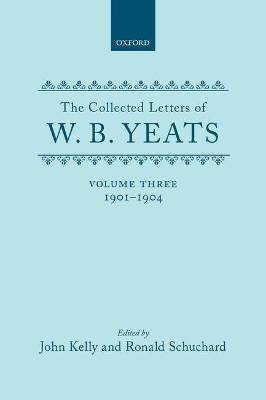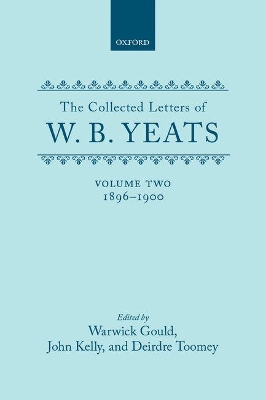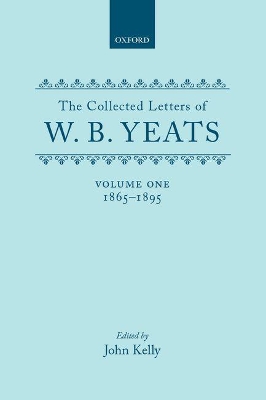Yeats Collected Letters
3 total works
The letters in this volume, the majority never before published, vividly document a tunultuous period in Yeats's life. They chart his transformation from a late Romantic, `Celtic' poet into a powerful and astringent modernist, the foundation of the Abbey Theatre and development of his own palywriting career, the emotional devastation of his beloved Maud Gonne's marriage to a man he despised, the encouragement of promising young writers including Joyce and Synge, and the impact of his first exposure to the United States. Letter by letter we see how private concerns and public controversies forced him to redefine his views on artistic freedom and responsibility, and to reshape his style. Rich and readable notes provide a narrative of these years, explaining allusions, and setting the correspondence in its cultural and political contexts as well as relating it to Yeats's canon as a whole. This book will be indispenable to anyone interested in the development of modern poetry, drama, and cultural history.
The Collected Letters of W. B. Yeats: Volume II: 1896-1900
by W. B. Yeats
Published 4 September 1997
The letters in this volume, the majority never before published, vividly document the period in which Yeats, having left the family house in Bedford Park, began a new life in Bloomsbury; as he later recalled, `a new scene was set, new actors appeared'. With his association with the Savoy magazine and its circle of decadents, he achieved the financial emancipation that enabled him to begin his first affair with Olivia Shakespear. 1896 also saw the beginning of the
most important and creative friendship of his life, that with Lady Gregory; other influential friendships, such as those with Synge and W. T. Horton, were forged. In 1898, Yeats's friendship with George Moore expanded, only to contract with the disastrous collaboration on Diarmuid and Grania.
It was a period of considerable unhappiness for Yeats. His love for Maud Gonne was hopeless; in December 1898, she was to tell him of her long-standing affair with Lucian Millevoye (by whom she had two children). The crisis produced a run of confused and incoherent letters to Lady Gregory.
The letters also document Yeats's greatest early period of political activity. He organized the centenary celebrations of the 1798 uprising, while combating double agents within the Irish Revolutionary Brotherhood. In 1897, he began planning a National Theatre and letters chart a massive expansion of theatrical activity.
Letter by letter, we see how private concerns, artistic quarrels and exhausting political life forced him to develop a public persona. Rich and readable notes provide a narrative of these years, explaining allusions and setting the correspondence in its cultural and political contexts, as well as relating it to the emergence of Yeats's canon. The Collected Letters of W. B. Yeats is redefining the territory of modern literary history and this volume, with its valuable biographical and
thematic appendices, is indispensable to anyone interested in the development of modern poetry, Irish drama and cultural history.
most important and creative friendship of his life, that with Lady Gregory; other influential friendships, such as those with Synge and W. T. Horton, were forged. In 1898, Yeats's friendship with George Moore expanded, only to contract with the disastrous collaboration on Diarmuid and Grania.
It was a period of considerable unhappiness for Yeats. His love for Maud Gonne was hopeless; in December 1898, she was to tell him of her long-standing affair with Lucian Millevoye (by whom she had two children). The crisis produced a run of confused and incoherent letters to Lady Gregory.
The letters also document Yeats's greatest early period of political activity. He organized the centenary celebrations of the 1798 uprising, while combating double agents within the Irish Revolutionary Brotherhood. In 1897, he began planning a National Theatre and letters chart a massive expansion of theatrical activity.
Letter by letter, we see how private concerns, artistic quarrels and exhausting political life forced him to develop a public persona. Rich and readable notes provide a narrative of these years, explaining allusions and setting the correspondence in its cultural and political contexts, as well as relating it to the emergence of Yeats's canon. The Collected Letters of W. B. Yeats is redefining the territory of modern literary history and this volume, with its valuable biographical and
thematic appendices, is indispensable to anyone interested in the development of modern poetry, Irish drama and cultural history.
rich and distinguished work of scholarship
Conor Cruise O'Brien, The Listener
wonderfully edited by John Kelly ... nothing goes unexplained. The notes provide, often wittily, historical details about the 1880's and 1890's that no one has previously compiled. Kelly has performed many extraordinary feats of research. The biographical notes at the end are well written and helpful, and the analytical index on Yeats is just what is needed.
Richard Ellman, The New Republic
it is no exaggeration to claim that it marks a milestone in Yeats scholarship. The significance of this first volume lies not only in the content of the letters alone, but also in the sheer mass of beckground erudition assembled in this volume ... for a long, long time this monumental edition of Yeat's letters will be enlightening and delighting us.
John P. Frayne, Journal of English and Germanic Philology
This first volume sets a superlative standard for the books to come. Virtually every editorial and typographical decision taken here contributes to the usefulness, legibility, and attractiveness of the work.
The Modern Language Review
Conor Cruise O'Brien, The Listener
wonderfully edited by John Kelly ... nothing goes unexplained. The notes provide, often wittily, historical details about the 1880's and 1890's that no one has previously compiled. Kelly has performed many extraordinary feats of research. The biographical notes at the end are well written and helpful, and the analytical index on Yeats is just what is needed.
Richard Ellman, The New Republic
it is no exaggeration to claim that it marks a milestone in Yeats scholarship. The significance of this first volume lies not only in the content of the letters alone, but also in the sheer mass of beckground erudition assembled in this volume ... for a long, long time this monumental edition of Yeat's letters will be enlightening and delighting us.
John P. Frayne, Journal of English and Germanic Philology
This first volume sets a superlative standard for the books to come. Virtually every editorial and typographical decision taken here contributes to the usefulness, legibility, and attractiveness of the work.
The Modern Language Review


